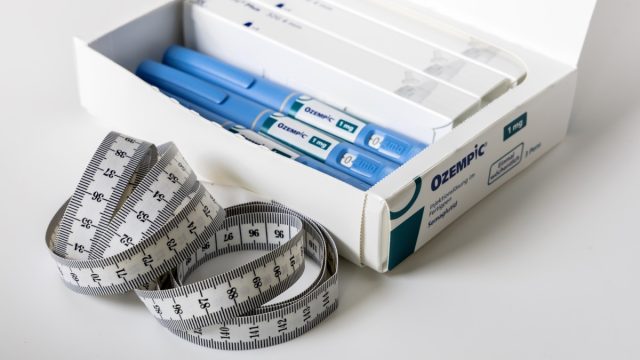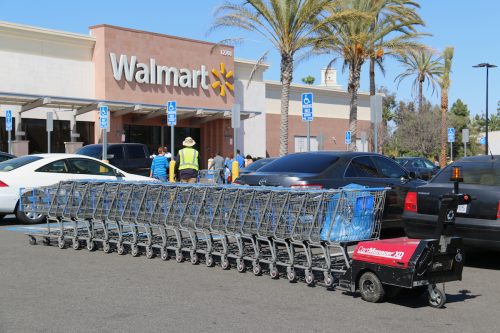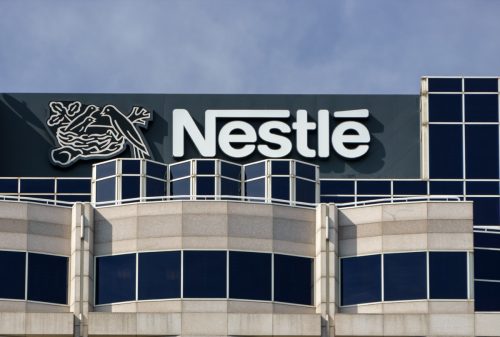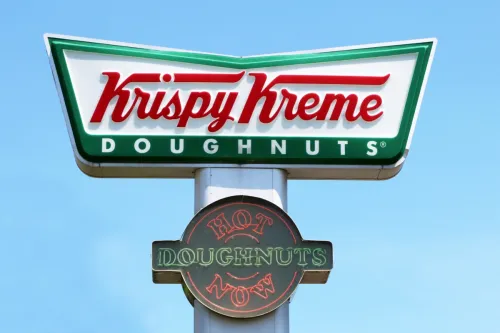Ozempic Has Food Brands Like Nestlé and Krispy Kreme in a Panic

Ozempic, Wegovy, and Mounjaro are three of the hottest buzzwords in 2023, making headlines for dramatic weight loss results, as well as painful adverse events. Aside from the gastrointestinal issues associated with these medications, the drugs have had other surprising side effects on the food industry. Some major brands are feeling the impact of glucagon-like peptide-1 (GLP-1) agonists like Ozempic, fearing patients’ decreased appetites could potentially impact profits. Read on to find out how brands like Nestlé and Krispy Kreme may be affected.
RELATED: Shoppers Are Turning Away From Walmart—And Ozempic May Be to Blame.
Walmart kicked off the conversation last month.

In early October, Walmart CEO John Furner caused a stir when he told Bloomberg that weight loss and diabetes drugs could be driving down sales of food items at its stores.
“We definitely do see a slight change compared to the total population, we do see a slight pullback in overall basket,” Furner said. “Just less units, slightly less calories.”
The CEO was citing recent data collected on American customers, comparing the shopping habits of those on drugs like Ozempic to the habits of those who aren’t. However, Furner said it was still too soon to draw concrete conclusions about the relationship between appetite suppressants and shopping.
Now, additional well-known brands are coming forward with concerns.
RELATED: New Drug Has People Losing 60 Pounds on Average, Research Shows—And It’s Not Ozempic.
Nestlé is developing “companion products” due to the uptick in Ozempic use.

Forbes reported last month that Nestlé is bracing itself for the impact of Americans’ suppressed appetites.
“The recent interest in a new class of drugs called GLP-1 agonists, has underlined the public’s desire to combat obesity rates around the world. I believe we have important contributions to make,” Nestlé CEO Mark Schneider said during an Oct. 19 earnings call, noting that the new therapies aren’t a permanent solution or replacement for a balanced diet and exercise.
To address this, Schneider said that Nestlé is working on “a number of companion products” for patients taking these drugs. The goal, he explained, would lower the risk of malnutrition and loss of lean muscle, as well as limit “weight rebound” once patients stop taking GLP-1s.
“These innovations are right in our wheelhouse, where we can bring our deep understanding of nutritional science and appropriate supplementation to the table,” Schneider said, adding that the company does not anticipate a large portion of the business to be affected. As Forbes points out, two of Nestlé’s largest businesses are coffee and pet food, both of which patients on Ozempic still buy.
In response to Best Life, a Nestlé spokesperson said the company has no additional comment.
RELATED: Ozempic Patient Reveals “Excruciating” New Side Effect.
Analysts downgraded Krispy Kreme’s stock on Monday.

Krispy Kreme could also feel the ramifications of these drugs—and analysts are raising concerns.
Financial services company Truist slashed its outlook for Krispy Kreme earlier this week, downgrading the stock from a buy to a hold. As analyst Bill Chappell told Forbes, this rating is in response to the popularity of drugs like Ozempic and Wegovy, which he said is impacting all packaged food snacks.
Truist anticipates that the stock, as well as similar stocks, will “be stuck in a holding pattern at best,” adding that the pattern is similar to the mid-2000s when low-carb diets were all the rage. While Chappell also told Forbes that we don’t yet know how much of an impact these drugs will have on American food consumption, JPMorgan analysts said that food producers are the “biggest loser[s]” in the age of weight loss drugs.
Best Life reached out to Krispy Kreme for comment and will update the story with its response.
Other analysts and executives aren’t as worried.

All of these fears aside, food companies may not be in serious trouble, according to The Wall Street Journal. The outlet reported that the prevalence of weight-loss drugs has given way to “wild scenarios conjured up by analysts,” like junk-food companies selling carrot sticks, or airlines using less fuel due to collective passenger weight loss.
The outlet points out that while Americans can benefit from shedding pounds, a “slimmer” America is still far off. In the U.S., these drug therapies remain expensive and cause tricky side effects, which is compounded by the fact that Americans don’t have the best eating habits overall.
There’s also little evidence that Ozempic use is currently hitting sales and profits for major food and beverage companies, the WSJ reported, noting that PepsiCo said it hasn’t seen any impact, and Abbott Laboratories, which makes a glucose-monitoring system for patients with diabetes, reported strong earnings and sales.
“I think the concerns are overblown,” Abbott CEO Robert Ford said during the company’s October earnings call, per WSJ. “I think early on those initial thoughts about the future are generally impacted more by emotion than facts and data.”
RELATED: For more up-to-date information, sign up for our daily newsletter.